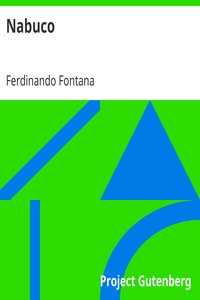Nabuco by Ferdinando Fontana
"Nabuco" by Ferdinando Fontana is a dramatic poem written in the late 19th century. The work is structured as a tragedy centering around the figure of Nebuchadnezzar, the mighty king of Babylon, who experiences the pitfalls of pride and madness. The poem appears to explore themes of power, ambition, and the consequences of warfare, reflecting a broader critique against militarism and the costs of conflict. The opening of "Nabuco" introduces the historical
context of Nebuchadnezzar's reign, vividly recounting his conquests, including twice besieging Jerusalem. The text conveys the king's hubris and how it ultimately leads to his downfall, where he becomes insane and lives in the wilderness. The prologue sets up a cultural and political commentary that critiques the formation of large armies and the consequent societal paralysis, inviting readers to reflect on the true nature of civilization and the necessity for peace. Characters such as Daìra and Argiasp are introduced, hinting at personal conflicts and deeper narratives intertwined with the overarching themes of the poem. (This is an automatically generated summary.)
Read or download for free
| How to read | Url | Size | |||
|---|---|---|---|---|---|
| Read now! | https://www.gutenberg.org/ebooks/25312.html.images | 198 kB | |||
| EPUB3 (E-readers incl. Send-to-Kindle) | https://www.gutenberg.org/ebooks/25312.epub3.images | 123 kB | |||
| EPUB (older E-readers) | https://www.gutenberg.org/ebooks/25312.epub.images | 124 kB | |||
| Kindle | https://www.gutenberg.org/ebooks/25312.kf8.images | 240 kB | |||
| older Kindles | https://www.gutenberg.org/ebooks/25312.kindle.images | 213 kB | |||
| Plain Text UTF-8 | https://www.gutenberg.org/ebooks/25312.txt.utf-8 | 139 kB | |||
| Download HTML (zip) | https://www.gutenberg.org/cache/epub/25312/pg25312-h.zip | 120 kB | |||
| There may be more files related to this item. | |||||
Similar Books
About this eBook
| Author | Fontana, Ferdinando, 1850-1919 |
|---|---|
| Title | Nabuco |
| Note | Reading ease score: 59.5 (10th to 12th grade). Somewhat difficult to read. |
| Credits | Produced by Claudio Paganelli, Carlo Traverso and the Online Distributed Proofreading Team at https://www.pgdp.net (This file was produced from images generously made available by Biblioteca Nazionale Braidense - Milano) |
| Language | Italian |
| LoC Class | PQ: Language and Literatures: Romance literatures: French, Italian, Spanish, Portuguese |
| Subject | Italian drama |
| Category | Text |
| EBook-No. | 25312 |
| Release Date | May 3, 2008 |
| Most Recently Updated | Jan 3, 2021 |
| Copyright Status | Public domain in the USA. |
| Downloads | 162 downloads in the last 30 days. |
| Project Gutenberg eBooks are always free! | |


